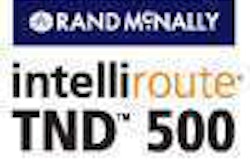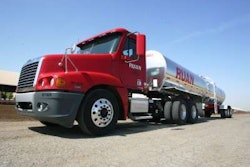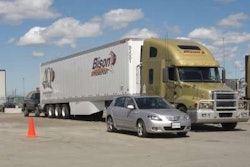Sustainability is a hot topic these days, ranging from environmental policies to business and economic practices. On Monday, Sept. 21, David Wangler discussed ways that carriers can achieve sustainability during an unusually challenging economy.
Wangler, chief executive officer of TMW Systems, delivered the keynote address at TMW Systems’ TransForum user conference and exhibition held at the Opryland Convention Center in Nashville, Tenn.
In business, sustainability is a simple concept: satisfy profits and increase shareholder value and opportunities for employees. In practice, Wangler said, it will require companies to: develop creative alternatives to conventional growth by emphasizing quality over quantity; be more cost-effective and nimble; and learn to do different things in different ways.
As an example of a carrier that has developed a sustainable business model in the harshest of environments, Wangler cited TMW customer Carlile Transportation Systems, one of Alaska’s largest trucking companies. The fleet recently has been successful in earning new, profitable business in the commercial salmon industry by operating team drivers and offering better systems than airlines for temperature control and visibility of freight.
During the conference, TMW Systems — the largest developer and integrator of transportation management software for the trucking industry — also announced several new products and services for its diversified software business.
The Data Warehouse is an enhancement to ResultsNow by TMW, a real-time performance monitoring and reporting tool. The Data Warehouse separates data intended for business reporting from daily transactional data into a structure designed specifically for fast and responsive query and analysis.
The TMW Data Warehouse is a no-charge addition to ResultsNow, available to existing and future TMW customers. ResultsNow is available for the enterprise transportation systems TMWSuite and TL2000, as well as the TMT Fleet Maintenance software.
“We’re addressing the market need for scalable, enterprise-level transportation-specific reporting capabilities by offering this platform according to internationally recognized data standards,” said TMW Chief Operating Officer David Mook. “Our data warehouse architecture follows accepted industry guidelines for reporting and analytical data platforms.”
With TMW Data Warehouse, transportation firms now can incorporate data from multiple sources, such as financial databases, fleet maintenance systems and even mobile communications applications, Mook said. “For mid-size and large firms, this technical approach opens new avenues for delivering timely business intelligence.”
As a software development and solutions delivery company, TMW Systems already deploys comprehensive hosting services to fully manage back-end and customer-facing operations for many of its software customers in industries such as freight transportation, waste and municipal fleets. The announcement formalizes those services for marketing and sales purposes.
TMW says the software is an affordably-priced cross-platform product and that its rollout comes after a successful release of TMW Freight Analyst earlier in the year that was limited to TruckMate Command Center customers.
According to the company, TMW Freight Analyst integrates activity-based costing, revenue data, the impact of timing in areas like service performance, and driver hours-of-service; additional capabilities include freight flow analysis to identify ongoing business improvement opportunities in daily operations and in a carrier’s sales activities.
Using the Market Rate Index (MRI) to compare a carrier’s lane and load pricing with current industry averages, the product also offers lane and bid pricing guidance to increase overall profitability. TMW says its MRI is a comprehensive North American rating database compiled for the truckload industry, fed by actual freight transactions from a large population of carriers and updated each month.
TMW Freight Analyst is a dashboard-style snapshot of business intelligence that focuses on historical load and transaction analysis for management decisions, rather than daily KPI tracking, according to the company; it incorporates a set of key features from the IDSC Netwise software system, but does not include the extensive configuration options, scenario and what-if analysis capabilities of that application.










